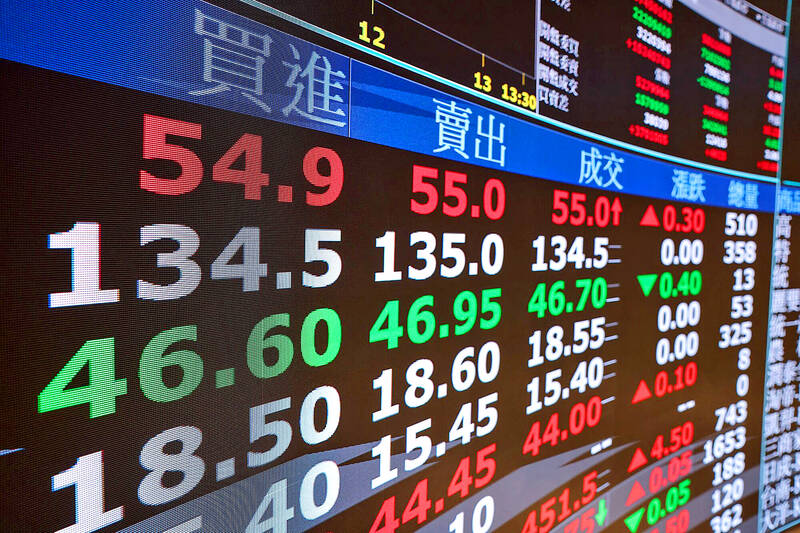The nation’s securities account balance, a gauge of retail investors’ confidence in local equities, rose to its highest level in four months last month, as the TAIEX maintained its upward momentum from the previous month, data released by the central bank showed on Thursday.
The securities account balance increased for a second consecutive month to NT$3.34 trillion (US$106.70 billion), up NT$46.2 billion from NT$3.29 trillion in the previous month, the data showed.
In terms of the proportion of market transactions, retail investors accounted for 56.7 percent of the trading volume, compared with 56 percent one month earlier, while foreign institutional players accounted for 30.8 percent, down from 33.5 percent, the data showed.

Photo: Bloomberg
The central bank’s latest data reflected that stock market sentiment remained bullish in the past two months as the TAIEX averaged 17,570 points last month, up from 16,978 points in November and 16,422 points in October.
The daily average turnover on the local bourse also expanded to NT$292 billion last month, compared with NT$271.4 billion in November and NT$248.5 billion in October, the data showed.
The benchmark index yesterday closed at 17,995.03 points, down 0.04 percent from the previous session but having risen 0.4 percent so far this month, the Taiwan Stock Exchange’s data showed.
“The securities account balance last month hit the third highest on record and the annual growth rate in M2 money supply is still within the central bank’s target of between 2.5 percent and 6.5 percent despite five interest rate hikes since March 2022, indicating that funding activity in the private sector remained vibrant and the liquidity level in the entire market is still abundant — which is beneficial to consumption, the stock market and other investment activities,” Yuanta Securities Investment Consulting Co (元大投顧) said in a note on Thursday.
With the continued increase in the securities account balance, M1B money supply — a measure of money in circulation, including currency and passbook savings deposits — posted an annual growth rate of 3.11 percent, up from a 3.03 percent increase in November, the central bank said in a report, attributing the increase to faster annual growth in passbook savings deposits.
The annual growth rate in broader measure M2 — which includes time deposits, time-saving deposits, foreign currency deposits, mutual funds and M1B — slowed to 5.3 percent from 5.33 percent, due to a sequential decrease in net foreign capital inflows, it said.
For the whole of last year, M1B rose 2.82 percent and M2 advanced 6.25 percent from a year earlier, central bank data showed.
“The latest money supply data show that the liquidity in the nation’s financial system remains sufficient within a neutral-to-loose monetary policy environment, which is conducive to overall economic growth,” Yuanta said.

PATENTS: MediaTek Inc said it would not comment on ongoing legal cases, but does not expect the legal action by Huawei to affect its business operations Smartphone integrated chips designer MediaTek Inc (聯發科) on Friday said that a lawsuit filed by Chinese smartphone brand Huawei Technologies Co (華為) over alleged patent infringements would have little impact on its operations. In an announcement posted on the Taiwan Stock Exchange, MediaTek said that it would not comment on an ongoing legal case. However, the company said that Huawei’s legal action would have little impact on its operations. MediaTek’s statement came after China-based PRIP Research said on Thursday that Huawei filed a lawsuit with a Chinese district court claiming that MediaTek infringed on its patents. The infringement mentioned in the lawsuit likely involved

Taipei is today suspending work, classes and its US$2.4 trillion stock market as Typhoon Gaemi approaches Taiwan with strong winds and heavy rain. The nation is not conducting securities, currency or fixed income trading, statements from its stock and currency exchanges said. Authorities had yesterday issued a warning that the storm could affect people on land and canceled some ship crossings and domestic flights. Taiwan Semiconductor Manufacturing Co (TSMC, 台積電) expects its local chipmaking fabs to maintain normal production, the company said in an e-mailed statement. The main chipmaker for Apple Inc and Nvidia Corp said it has activated routine typhoon alert

GROWTH: TSMC increased its projected revenue growth for this year to more than 25 percent, citing stronger-than-expected demand for AI devices and smartphones The Taiwan Institute of Economic Research (TIER, 台灣經濟研究院) yesterday raised its forecast for Taiwan’s GDP growth this year from 3.29 percent to 3.85 percent, as exports and private investment recovered faster than it predicted three months ago. The Taipei-based think tank also expects that Taiwan would see a 8.19 percent increase in exports this year, better than the 7.55 percent it projected in April, as US technology giants spent more money on artificial intelligence (AI) infrastructure and development. “There will be more AI servers going forward, but it remains to be seen if the momentum would extend to personal computers, smartphones and

Catastrophic computer outages caused by a software update from one company have once again exposed the dangers of global technological dependence on a handful of players, experts said on Friday. A flawed update sent out by the little-known security firm CrowdStrike Holdings Inc brought airlines, TV stations and myriad other aspects of daily life to a standstill. The outages affected companies or individuals that use CrowdStrike on the Microsoft Inc’s Windows platform. When they applied the update, the incompatible software crashed computers into a frozen state known as the “blue screen of death.” “Today CrowdStrike has become a household name, but not in